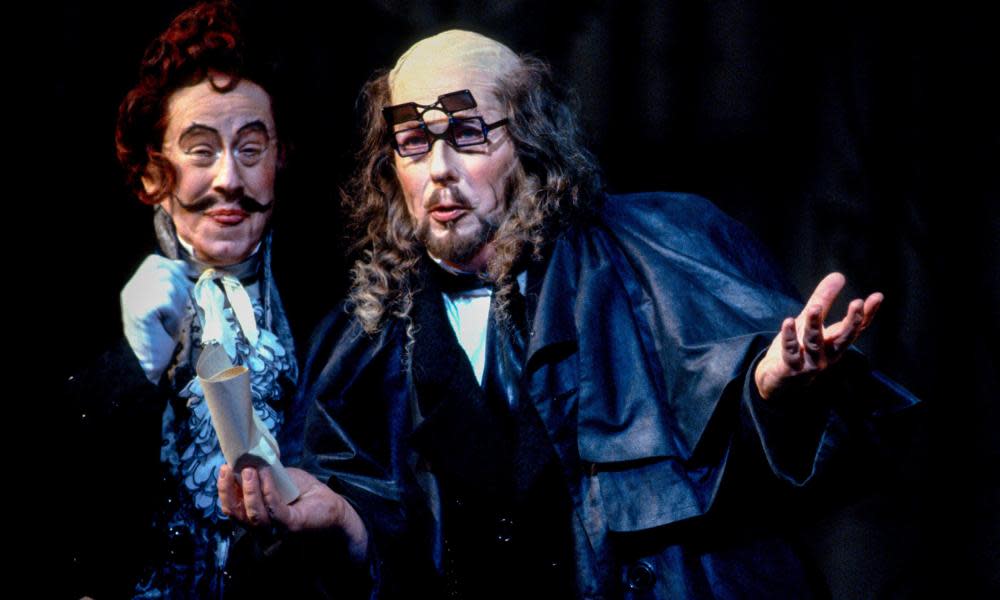John Dobson obituary

A comprimario tenor is one who specialises in secondary roles, fulfilling a vital function while others take the glory. John Dobson, who has died aged 92, clocked up more than 2,000 performances in around 90 roles at Covent Garden alone by the time he retired in 1995.
A dependable, stalwart member of the company at the Royal Opera, he sang the treacherous courtier Shuisky to Boris Christoff’s Tsar in Mussorgsky’s Boris Godunov, and the police agent Spoletta to eight different Scarpias including Tito Gobbi, Peter Glossop and Geraint Evans in Puccini’s Tosca. With his mercurial facility for inhabiting the multiple roles he undertook, he also fitted the definition of a character tenor: a singer whose clear enunciation and acting skills enables him to bring subsidiary characters vividly to life.
After studying, initially as a baritone, at the Guildhall School of Music with Norman Walker and in Italy with Giovanni Inghilleri, he made his debut in Bergamo in 1956 as Pinkerton in Madama Butterfly. That was not the only principal role he essayed in his early years: he also took on Alfredo in La Traviata and Rodolfo in La Bohème, but rapidly came to realise that his future lay in comprimario roles.
He made his Covent Garden debut in December 1959 as Faninal’s Major Domo in Der Rosenkavalier, having joined the company on 1 October, the same day as Georg Solti, who conducted the performance.
In 1962 Dobson created the role of Paris in Michael Tippett’s King Priam, given its premiere by the Royal Opera at the Coventry Festival to mark the consecration of the new cathedral. The director was Sam Wanamaker, to whom he attributed his understanding of the need to create an inner life for the character he was portraying, based on a close observation of the psychology of that character and the emotions and situations to which they are subject.
Wanamaker, following Stanislavsky, warned against complete identification with the character, on the grounds that emotional involvement precluded the objectivity required for a convincing portrayal.
Dobson was also aware of the need to refresh his interpretation of each character depending on the singers taking the principal roles. “I don’t know how many times I’ve done Spoletta – 130, 140, or something like that. The point is that the Scarpia changes so it’s never the same performance. It’s always new, because the characters around you are new.”
Born in Derby, he was the son of Mary and Mervyn Dobson, a garage owner and motor engineer. In the 1950s he made his living for a while as a jobbing singer, performing in Christmas pantomimes – with the comedian Cyril Fletcher among others – and summer shows at seaside resorts, the first being at Bognor Regis, where the principal was Clive Dunn. After his Bergamo debut he returned to Britain to sing with the New Opera Company and at Glyndebourne, followed by engagements with opera companies at home and abroad.
His gallery of characters included a reptilian Mime and a trenchant Loge in Wagner’s Ring Cycle (other Wagnerian roles were David in The Mastersingers of Nuremberg and Melot in Tristan and Isolde), a shrewd Goro in Madama Butterfly and an assertive Bob Boles in Peter Grimes, as well as Jacquino in Fidelio, Andres in Wozzeck, Pang and the Emperor in Turandot, Snout in A Midsummer Night’s Dream, Sellem in The Rake’s Progress and Spalanzani in Les Contes d’Hoffmann. He also created the role of Luke in Tippett’s The Ice Break (1977).
The bass John Tomlinson remembers him as “a vigorously effective actor with incisive voice and diction and a ‘ping’ that flew to the back of the stalls, typical of that generation”.
One night in February 1976 he was released at short notice by Covent Garden to stand in for an indisposed Mime in a performance of Siegfried under Charles Mackerras at English National Opera. “Mr Dobson naturally only sings the role in German,” announced the management to a ripple of anticipatory merriment, which swelled into full-blown hilarity when it was further explained that due to the complexity of the characters’ exchanges, Siegfried and Alberich would also sing their roles in German.
Dobson brought his communicative skills to bear in the large amount of educational work he cheerfully undertook in the 80s and 90s. Not only did he help devise projects for young people from infants to undergraduates, but he had a gift for engaging sometimes recalcitrant audiences. He also served on the board of Opera 80 for 10 years and as an adviser to British Youth Opera.
His first marriage ended in divorce in 1988. In 2020 he married Deidre Tilley, and she survives him.
• John Mervyn Frederick John Dobson, tenor, born 17 November 1930; died 14 May 2023

 Yahoo News
Yahoo News 
